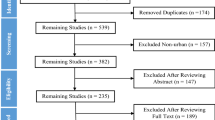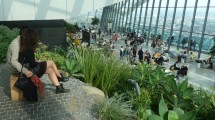Abstract
This study reviews the sustainable urban design concept and identifies critical factors for enhancing social sustainability of urban renewal projects. Through a questionnaire survey carried out in Hong Kong, the opinions of architects, planners, property development managers, and local citizens were sought and evaluated. The results derived from factor analysis indicated that certain design features should be incorporated for achieving social sustainability. “Satisfaction of Welfare Requirements”, “Conservation of Resources & the Surroundings”, “Creation of Harmonious Living Environment”, “Provisions Facilitating Daily Life Operations”, “Form of Development” and “Availability of Open Spaces” were believed to be the significant underlying factors for enhancing social sustainability of local urban renewal projects.



Similar content being viewed by others
Notes
Hong Kong Institute of Architects (HKIA), Hong Kong Institute of Planners (HKIP), Real Estate Developers Association of Hong Kong (REDA).
Yau Tsim Mong, Sham Shui Po, Wan Chai, and Central & Western districts are selected for this questionnaire survey.
References
Adams, D., & Hastings, E. M. (2001). Urban renewal in Hong Kong: Transition from development corporation to renewal authority. Land Use Policy, 18(3), 245–258.
Aron, A., & Aron, E. N. (2002). Statistics for the behavioral and social sciences: A brief course. New York: Prentice Hall.
Berke, P., & Manta Conroy, M. (2000). Are we planning for sustainable development? An evaluation of 30 comprehensive plans. Journal of the American Planning Association, 66(1), 21–33.
Che Musa, C. O. (2000). Urbanization versus urban planning practice in Malaysia: Considerations, prospects and possibilities. In A. G. O. Yeh & M. K. Ng (Eds.), Planning for a better urban living environment in Asia (pp. 54–68). Aldershot: Ashgate.
Chan E.H., & Yung E. H. K. (2004). Is the development control legal framework conducive to a sustainable dense urban development in Hong Kong? Habitat International, 28, 409–426.
Chiu, R. L. H. (2003). Social sustainability, sustainable development and housing development: The experience of Hong Kong. In R. Forrest & J. Lee (eds.), Housing and social change: East-west perspectives (pp. 221–239). USA: Routledge.
Commission for Architecture and the Built Environment (CABE), and Department of the Environment, Transport and the Regions (DETR) (2001). The value of urban design: A research project commissioned by CABE and DETR to examine the value added by good urban design. London: Thomas Telford.
Comrey, A. L., & Lee, H. B. (1992). A first course in factor analysis. New Jersey: Lawrence Erlbaum Associates.
Corbett, J., & Corbett, M. (2000). Designing sustainable communities: Learning from village homes. Canada: Island Press.
Couch, C. (1990). Urban renewal theory and practice. London: Macmillan Education Ltd.
Couch, C., & Dennemann, A. (2000). Urban regeneration and sustainable development in Britain. The example of the Liverpool Ropewalks Partnership. Cities, 17(2), 137–147.
Council for Sustainable Development. (2004). Report on the urban living space pilot area forum. In Sustainable development: Making choices for our future—Pilot area forum (Council for Sustainable Development, Hong Kong), 11 September (2004).
Cuthbert, A. R., & Dimitriou, H. T. (1992). Redeveloping the fifth quarter—A case study of redevelopment in Hong Kong. Cities, 9(3), 186–204.
De Vaus, D. A. (2001). Research design in social research. London: Sage Publications.
DETR (2000). By design: urban design in the planning system: Towards better practice. London: Thomas Telford.
Enyedi, G. (2002). Social sustainability of large cities. Ekistics, 69 (412–414), 142–144.
Fung, A. Y. S. (2004). Sustainable development and the conservation of natural and cultural heritage. In T. Mottershead, (Ed.), Sustainable development in Hong Kong (pp. 387–420). Hong Kong: Hong Kong University Press.
Grange, A. L. (2004). Sustainable development and housing. In T. Mottershead (Ed.), Sustainable development in Hong Kong (pp. 323–352). Hong Kong: Hong Kong University Press.
Housing Planning and Lands Bureau (2001). Urban renewal strategy. Hong Kong: Housing Planning and Lands Bureau.
Kim, J. O., & Mueller, C. W. (1978). Factor analysis: Statistical methods and practical issues. London: Sage Publications.
Kline P. (1994). An easy guide to factor analysis. London: Routledge.
Lai K. T. (2002). Long Walk to Sustainability. South China Morning Post, 13 September (2002).
Lee, J. S. (2003). Enhancing sustainability in downtown by triple-value adding to urban redevelopment efforts: A case study of Seoul, Korea. Unpublished Thesis. University of Washington.
Li, M. M., & Brown, H. J. (1980). Micro-neighborhood externalities and hedonic housing prices. Land Economics, 56(2), 125–141.
Ng, M. K. (2002). Property-led urban renewal in Hong Kong: Any place for the community? Sustainable Development, 10(3), 140–146.
Ng, M. K., Cook, A., & Chui, E. W. T. (2001). The road not travelled: A sustainable urban regeneration strategy for Hong Kong. Planning Practice and Research, 16(2), 171–183.
Oktay, D. (2004), Urban design for sustainability: A study on the Turkish City. International Journal of Sustainable Development and World Ecology, 11(1), pp. 24–35.
Omann, I., & Spangenberg, J. H. (2002). Assessing social sustainability: The social dimension of sustainability in a socio-economic scenario. In 7th biennial conference of the International Society for Ecological Economics in Sousse (Sustainable Europe Research Institute (SERI), Tunisia), 6–9 March 2002.
Planning Department. (2002a). Hong Kong 2030: Planning vision and strategy. Retrieved October 23rd, (2004), from http://www.info.gov.hk/planning/index_e.htm.
Planning Department (2002b). Urban design guidelines for Hong Kong: Executive summary. Hong Kong: Hong Kong SAR.
Porta, S., & Renne, J. L. (2005). Linking urban design to sustainability: Formal indicators of social urban sustainability field research in Perth, Western Australia. Urban Design International, 10(1), 51–64.
Rothenberg, J. (1969). Economic evaluation of urban renewal: Conceptual foundation of benefit-cost analysis. Washington: The Brookings Institution.
Samson, P. (1995). The concept of sustainable development. discussion paper. Switzerland: Green Cross International.
Shearlock C., James P., & Phillips, J. (2000). Regional sustainable development: Are the new regional development agencies armed with the information they require? Sustainable Development, 8(2), 79–88.
Smith, P. C. (2000). Sustainability and urban design. In W. S. Wong & E. H. W. Chan (Eds.), Building Hong Kong: Environmental considerations (pp. 17–42). Hong Kong: Hong Kong University Press.
Stiglitz, J. E. (2001). Employment, social justice, and societal well-being. In ILO Global employment forum 1–3 (Labour Organization, Ghent), November (2001).
Urban Renewal Authority: (2003), Urban renewal authority Annual Report 2002–2003 (Urban Renewal Authority, Hong Kong).
Vandell, K. D., Lane, J. S., & Kain, J. F. (1989). The Economics of architecture and urban design: Some preliminary findings. AREUE Journal, 17(2), 235–265.
World Commission on Environment, Development (WCED) (1987). Our common future. UK: Oxford University Press.
Acknowledgement
This study is supported by research grant provided by the Hong Kong Polytechnic University
Author information
Authors and Affiliations
Corresponding author
Rights and permissions
About this article
Cite this article
Chan, E., Lee, G.K.L. Critical factors for improving social sustainability of urban renewal projects. Soc Indic Res 85, 243–256 (2008). https://doi.org/10.1007/s11205-007-9089-3
Received:
Accepted:
Published:
Issue Date:
DOI: https://doi.org/10.1007/s11205-007-9089-3




